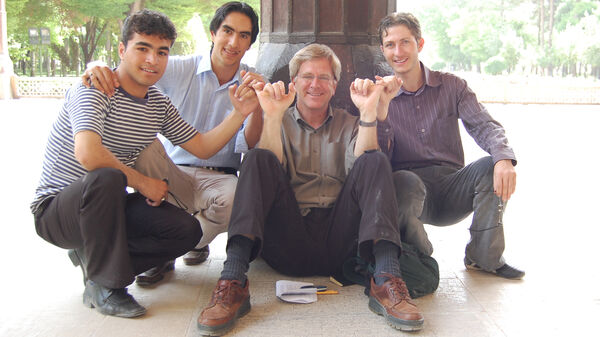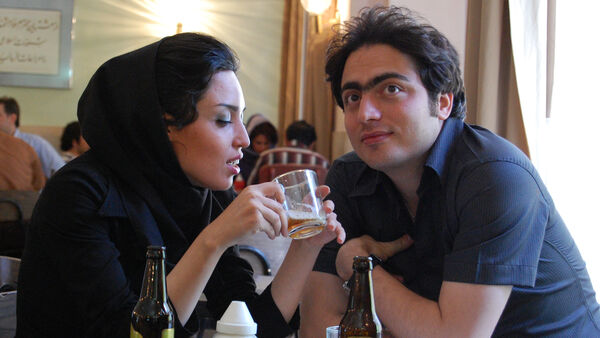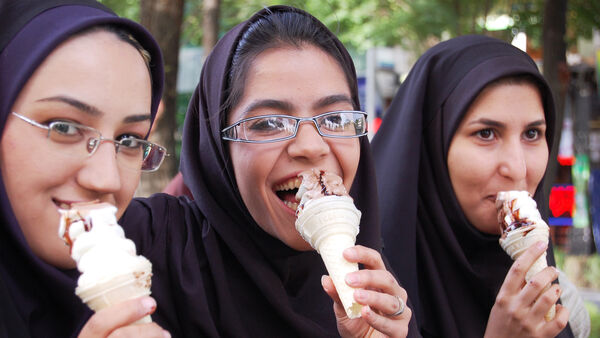Iran Travel Journal (part 6)



Back To Europe: Tight Pants, Necklines, Booze...and Freedom
My flight out of Iran was scheduled for 3 a.m. For whatever reason, planes leaving for the West depart in the wee hours. The TV crew had caught an earlier flight, Seyed had gone home, and I was groggy and alone.
Walking down the jetway onto my Air France plane, I saw busty French flight attendants—hair flowing freely—greeting passengers at the door. It was as if the plane was a lifeboat, and they were pulling us back to the safety of the West. People entered with a sigh of relief, women pulled off their scarves…and suddenly we were free to be "normal." The jet lifted off, flying in the exact opposite route the Ayatollah had traveled to succeed the Shah.
For 12 days, I'd been out of my comfort zone, in a land where people live under a theocracy and find different truths to be God-given and self-evident. I tasted not a drop of alcohol, and I never encountered a urinal. Women were not to show the shape of their body or their hair (and were beautiful nevertheless). It was a land where people took photos of me, as if I were the cultural spectacle.
Landing in Paris was reverse culture shock. I sipped wine like it was heaven-sent. I noticed hair, necklines, and tight pants like never before. University students sat at outdoor cafés, men and women mingling together as they discussed whatever hot-button issue interested them. After the Valium-paced lifestyle of Iran, I felt an energy and efficiency cranked up on high. People were free to be "evil." And, as I stood before that first urinal, I was thankful to be a Westerner.
Reflecting on My Motives…and the Real Souvenir I Carried Home
Returning home to the US, I faced a barrage of questions—mainly, "Why did you go to Iran?" Some were skeptical of my motives, accusing me of just trying to make a buck. (As a businessman, I can assure you there's no risk of a profit in this venture.) Others condemned me for acting as a Jane Fonda–type mouthpiece for an enemy that has allegedly bankrolled terrorists.
But I didn't go to Iran as a businessman or as a politician, but as what I am—a travel writer. I went for the same reasons I travel everywhere: to get out of my own culture and learn, to go to a scary place and find it's not so scary, and to bring distant places to people who've yet to go there. To me, understanding people and their lives is what travel is about, no matter where you go. And, as a TV-producing travel writer, this was the opportunity of a lifetime.
I have long held that travel can be a powerful force for peace. Travel promotes understanding at the expense of fear. And understanding bridges conflict between nations. As Americans, we've endured the economic and human cost of war engulfing Iran's neighbor, Iraq. Seeing Iraq's cultural sites and its kind people being dragged through the ugliness of that war, I wished I'd been able to go to Baghdad to preserve images of a peacetime Iraq. More recently, as our leaders' rhetoric has ramped up the possibility of another war—with Iran —I didn't want to miss that chance again. As an American taxpayer, I believe that every bullet that flies and every bomb that drops has my name on it. That's a big responsibility. It's human nature to not want to know the people on the receiving end of your "shock and awe"—but to do so is wrong. I wanted to put a human face on "collateral damage."
It's not easy finding a middle ground between "The Great Satan" and "The Axis of Evil." Some positions (such as President Ahmedinejad denying the Holocaust) are just plain wrong. But I don't entirely agree with my own president, either. Yes, there are evil people in Iran. Yes, the rhetoric and policies of Iran's leaders can be objectionable. But there is so much more to Iran than the negative image drummed into us by our media and our government.
My trip to Iran taught me things I could only understand by actually traveling there. First, I learned how thankful I am that I live in America instead of Iran. Yet I also learned that the vast majority of Iranians would choose to live nowhere else but their country.
Throughout my trip, I kept thinking, "Politicians come and go, but the people are here to stay." While I didn't like Iran's government, I gained an empathy and a deeper respect for its people. My initial fears about the place were overcome by the hospitality, spontaneity, and curiosity of the people. I found that while most Iranians didn't like America's government, they genuinely like Americans.
I left Iran struck more by what we have in common than by our differences. Most Iranians, like most Americans, couldn't care less about politics. They simply want a good, safe life for their loved ones. Just like my country, Iran has one dominant ethnic group and religion that's struggling with issues of diversity and change—liberal versus conservative, modern versus traditional, secular versus religious. As in my own hometown, people of great faith are suspicious of people of no faith or a different faith. Both societies seek a defense against the onslaught of modern materialism that threatens their traditional "family values." Both societies are suspicious of each other, and both are especially suspicious of each other's government.
My hope is that the TV show we produced (along with this journal) will help promote understanding between our two countries. When we travel—whether to an "Axis of Evil" country, or just to a place where people yodel when they're happy, or fight bulls to impress the girls, or can't serve breakfast until today's croissants arrive—we enrich our lives and better understand our place on this planet. People-to-people connections reduce fear and mistrust. We learn that we can disagree and still coexist peacefully.
Granted, there's no easy solution, but surely getting to know Iranian culture is a step in the right direction. Hopefully, even the most skeptical will appreciate the humanity of 70 million Iranian people. Our political leaders sometimes make us forget that all of us on this small planet are equally precious children of God. Having been to Iran, I feel this more strongly than ever. If this all sounds too idealistic, or even naive...try coming to Iran and meeting these people face-to-face.
Happy travels…and, as they say in Iran, "May peace be upon us."

